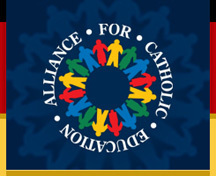
The Alliance for Catholic Education (ACE) program at the University of Notre Dame has been awarded a $436,500 grant from the Louis Calder Foundation to support its Curriculum, Instruction and Assessment (CI&A) initiative, an innovative model of professional development for teachers and principals in Catholic schools.
This partnership with the Calder Foundation and the pioneering Web-based curriculum program Curriki represents a milestone for ACE in its efforts to foster academic excellence in Catholic education as it advances its mission of sustaining and strengthening Catholic schools.
The Louis Calder Foundation, a private organization based in Connecticut, supports charter and parochial schools in the development and strengthening of comprehensive and content-rich curricula for kindergarten to eighth grade students.
The foundation’s three-year grant will allow ACE to refine and scale-up this unique model of professional development, which utilizes the benefits of technology and an important partnership with Curriki, a free on-line environment that uses wiki technology to allow membersñtypically educators and education expertsñto create, develop and distribute high-quality educational materials to anyone who needs them.
ACE has piloted its CI&A initiative in two dioceses to date, providing curriculum development workshops for master teachers and principals in Memphis, Tenn., and Pensacola, Fla.In addition to facilitating the development of learning communities among teachers in each diocese, through Curriki, ACE will cultivate virtual learning communities in Catholic schools and dioceses throughout the nation. The Curriki program allows ACE to utilize the knowledge and skills of teachers as primary resources, encouraging them to be creators and sharers of curricula rather than passive recipients of it. This model takes the best of a"bottom-up"approach and adds the feedback and involvement of experts in curriculum and instruction at the university level.
The key to the success of this model of professional development, according to Tom Doyle, director of the ACE master of education program and architect of CI&A, stems from"engaging master teachers, utilizing their talent, and elevating them to leadership roles about key issues ñ curriculum development and assessment."
In addition, ACE has structured its CI&A initiative so schools and teachers are meeting required accreditation standards through their participation. Workshops are spread over a period of three years, giving participants time to engage with ideas and concepts, while respecting demanding schedules and responsibilities. The first year focuses on curriculum development and the second year emphasizes classroom instruction that implements the curriculum designed during the previous year.In the third and final year of the partnership, the emphasis is on assessing students’ learning and growth.
The CI&A initiative is just one of many recent undertakings of the ACE program in response to the final report of the 2005-06 Notre Dame Task Force on Catholic Education, titled"Making God Known, Loved, and Served."The task force, convened by Notre Dame’s president, Rev. John I. Jenkins, C.S.C., was composed of 50 leaders from throughout the country, including Catholic educators, diocesan representatives, philanthropists, investment specialists and Notre Dame faculty and staff, and was chaired by Rev. Timothy R. Scully, C.S.C., co-founder of the ACE program.
The task force’s report outlines 12 strategic objectives for Notre Dame to help meet the most pressing needs of our nation’s elementary and secondary Catholic schools, and to date over 10,000 copies have been distributed to dioceses and Catholic school systems across the nation.Among the key goals identified by the task force as necessary for Catholic school renewal is the academic improvement of Catholic schools. The work of the CI&A initiative represents a crucial effort by Notre Dame toward achieving that goal.
The Alliance for Catholic Education program was founded in 1994 to address the urgent need for enthusiastic and effective Catholic school teachers.ACE annually places nearly 200 young men and women as full-time teachers in underserved Catholic schools throughout the country. ACE participants earn master’s degrees in education from Notre Dame during the course of their two-year teaching commitment.
ACE also established a principal preparation program, the ACE Leadership Program, in 2001 to form the next generation of lay Catholic school principals.Notre Dame, through the ACE Service Through Teaching Programand Leadership Program, prepares more Catholic school teachers and principals respectively than any other institution in the nation. Subsequent to the Notre Dame Task Force on Catholic Education, ACE has augmented its efforts in the areas of research and professional service to Catholic schools through its ACE Consulting and Notre Dame Magnificat Schools initiatives.
More information on these and other ACE programs are available on the Web at http://ace.nd.edu .
The Calder Foundation grant is a component of the $1.5 billion"Spirit of Notre Dame"capital campaign. Announced last year, the campaign is the largest such endeavor in the history of Catholic higher education.
_ Contact: TJ D’Agostino and Melissa Green, ACE,_ " adogosti@nd.edu ":mailto:adogosti@nd.edu or " mharraka@nd.edu ":mailto:mharraka@nd.edu
__
TopicID: 30526